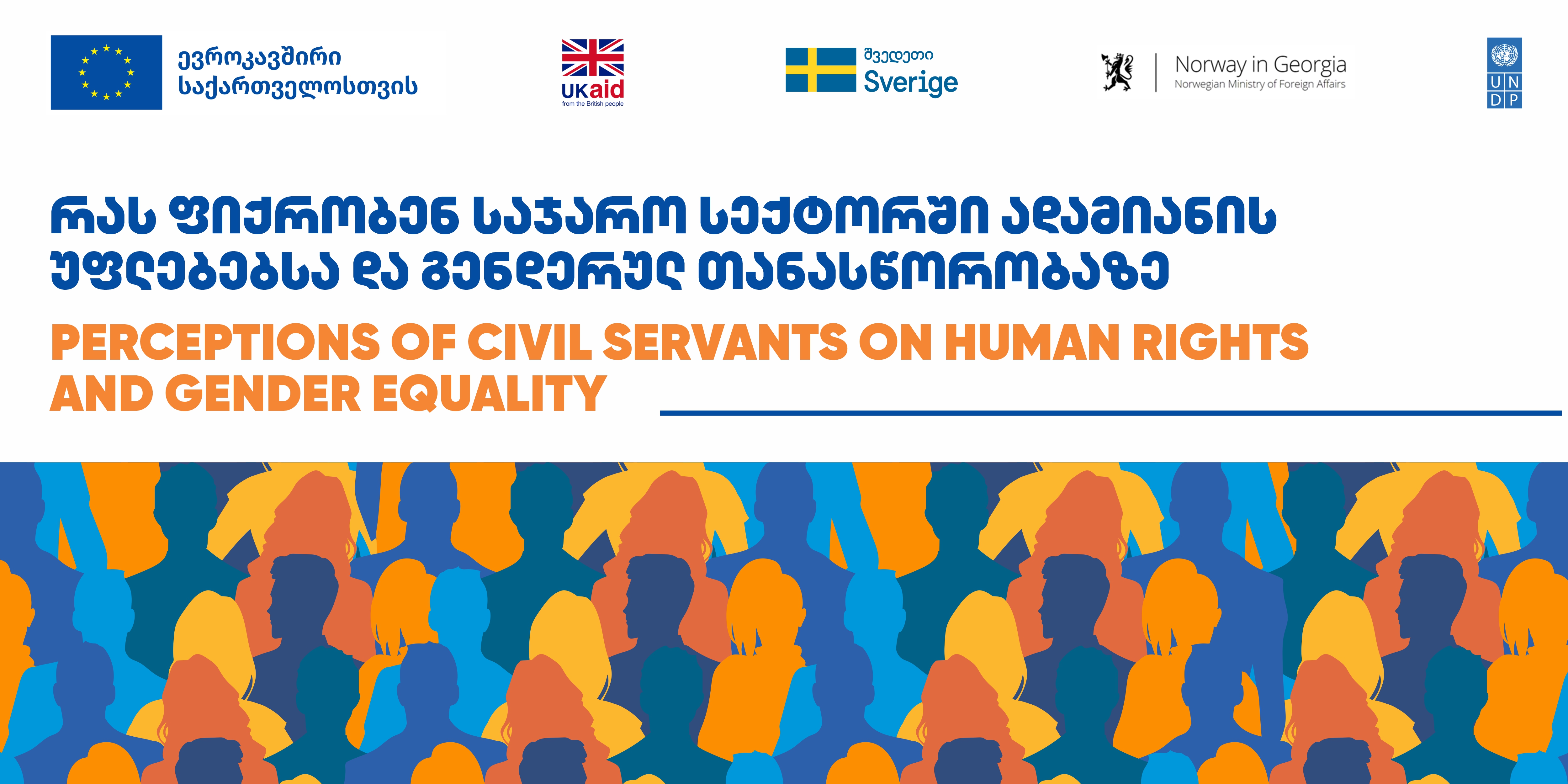Partnerships for an Inclusive and Rights-Driven Civil Service: Civil Service Bureau Joins Hands with EU, Norway, Sweden, UK, and UNDP
Research Unveils Georgian Civil Servants' Views on Human Rights and Gender Equality
February 29, 2024

Georgian Civil Servants' Views on Human Rights and Gender Equality
UNDP, in collaboration with Georgia’s Civil Service Bureau, unveiled new research shedding light on prevailing attitudes towards human rights and gender equality in civil service.
The study was conducted by the 'Applied Research Company' and supported by UNDP in partnership with the European Union, Norway, Sweden, and UK Aid from the UK Government.
It analyses civil servants’ attitudes towards workplace equality practices within the civil service, examines perceptions of fundamental values of human rights, equality, and inclusion, and reveals the gaps in understanding of human rights and their respect, protection, and fulfilment.
At the public presentation of the research on 29 February, Maia Dvalishvili, Deputy Head of the Civil Service Bureau, emphasized the crucial role of professional civil servants in building a society founded on human rights principles.
“The research indicates positive trends in civil servants’ attitudes towards human rights and gender equality. Respondents indicated that working conditions in the civil service adhere to the principle of equality, notwithstanding differences in the work experiences of male and female civil servants. Furthermore, the study underscores challenges, providing valuable insights for shaping plans and avenues for improvement."Maia Dvalishvili, Deputy Head of Georgia's Civil Service Bureau
"Our research shows that understanding and translating human rights principles into practice remain a challenge. By addressing these gaps and fostering inclusive policies, we can work towards a more equitable society where everyone’s rights are respected and protected."Douglas Webb, UNDP Resident Representative a.i. in Georgia
Other speakers included Niko Tatulashvili, Advisor on Human Rights to the Prime Minister of Georgia; Nicholas Cendrowicz, Head of Cooperation at the Delegation of the European Union to Georgia; Chris Reilly, Head of Programmes at the United Kingdom Embassy to Georgia; and Rebecca Lie, Deputy Ambassador of Norway to Georgia.
Research Findings:
Covering 103 public institutions across Georgia, the research combines qualitative insights from twenty in-depth interviews with civil servants and quantitative data from 1,162 interviews and opinion polls.
Findings show that Georgian civil servants express strong support for human rights and equality principles, advocating for robust state responses to violations and discrimination. However, the research also uncovers persistent stereotypes and prejudice influencing perceptions, particularly regarding gender roles, persons with disabilities, ethnic and religious minorities, and LGBTQI+ communities.
The research spotlights several human rights that civil servants consider most frequently violated in Georgia. These include the right to equality (40%), living in a healthy environment (32%), the right to life (31%), inviolability of personal and family life (25%), and inviolability of honour and dignity (25%).
According to civil servants, LGBTQI+ communities (44.6%), people employed in hazardous occupations (44.4%), and single mothers (32.2%) are vulnerable groups at highest risk of human rights violations.
Notably, gender-segregated data show that women civil servants are better informed and more sensitive to challenges faced by vulnerable groups. They demonstrate a clearer understanding of the legal needs of ethnic and religious minorities, LGBTQI+ communities, and persons with disabilities.
In addition to dissecting perceptions, the study emphasizes the importance of human rights education within the civil sector. It outlines areas for additional training and provides recommendations tailored to national and local public institutions, aiming to bridge knowledge gaps and enhance rights awareness among civil servants.
The full report is available here.
Media contacts:
- Sophie Tchitchinadze, UNDP, +995 599 196907, sophie.tchitchinadze@undp.org,
- Elene Sakvarelidze, UNDP, +995 599 003944, elene.sakvarelidze@undp.org
- Teiko Kandelaki, UNDP, +995 599 103525, tinatin.kandelaki@undp.org

 Locations
Locations



